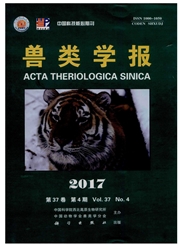

 中文摘要:
中文摘要:
旅游广泛地被用作直接补偿本地人或管理当局的保存策略,从而贡献开发并且创造刺激保存风景。因为,没有如此的种类,被旗舰种类住在的储备或公园也许能比那些通过旅游产生更多的收入旗舰种类为筹集资金并且为保存目标创造宣传有大潜力。在这篇论文,我们检验集中于观察的旗舰种类旅游金色翘鼻子在 Shennongjia 国家自然保护区(SNNR ) 的猴子(Rhinopithecus roxellana ) 。在程序在 2006 被运行以后,当在这个国家的旅游收入的一般趋势也增加了,两个都,旅游者的数字和 SNNR 收到的收入的数量增加了。作为结果, SNNR 显著地在旅游和保存基础结构增加了再投资。而且,在四年级生后面,政治家们访问了金色翘鼻子猴子,他们突然地向生物保存改变了态度,由的增加显示了常规、另外为种类保存资助。我们断定旗舰种类旅游不能仅仅为保存和管理产生收入而且能向保存生物多样性改进官员态度。然而,保证如此的节目的继续的安全和可持续性是重要的,从人和动物观点,并且我们建议更严格的措施被介绍从旅游者把喷雾器疾病传播的风险归结为猴子。
 英文摘要:
英文摘要:
Tourism has been widely used as a conservation strategy that directly compensates local people or management authorities, thereby contributing to development and creating incentives to preserve the landscape. Reserves or parks that are inhabited by flagship species may be able to generate more revenue through tourism than those without such species because flagship species have great potential for raising funds and creating publicity for conservation goals. In this paper, we examine flagship species tourism focused on observing the golden snub-nosed monkey (Rhinopithecus roxellana) in Shennongjia National Nature Reserve (SNNR). After the program was launched in 2006, both the number of tourists and amount of revenue received by SNNR in- creased as the general trends of tourism revenue in the country also increased. As a result, SNNR significantly increased rein- vestment in tourism and conservation infrastructure. Furthermore, after senior politicians visited the golden snub-nosed monkey, they abruptly changed their attitudes toward biological conservation, as indicated by an increase in both regular and additional funding for the species conservation. We conclude that flagship species tourism may not only generate revenue for conservation and management but also can improve officials' attitudes toward preserving biodiversity. However, it is important to ensure the continued safety and sustainability of such programs, from both the human and animal perspective, and we suggest stricter measures are introduced to reduce the risk of aerosol disease transmission from tourists to the monkeys.
 同期刊论文项目
同期刊论文项目
 同项目期刊论文
同项目期刊论文
 Habitat Selection of Black-and-white Snub-nosed Monkeys (Rhinopithecus bieti) in Tibet: Implications
Habitat Selection of Black-and-white Snub-nosed Monkeys (Rhinopithecus bieti) in Tibet: Implications Ranging pattern and population conposition of Rhinopithecus birti at Xiaochangdu, Tibet: Implication
Ranging pattern and population conposition of Rhinopithecus birti at Xiaochangdu, Tibet: Implication Activity Budget of Rhinopithecus bieti at Tibet: Effects of Day Length, Temperature and Food Availab
Activity Budget of Rhinopithecus bieti at Tibet: Effects of Day Length, Temperature and Food Availab Terrestrial Behavior and forest strata use in a group of Black-and-White Snub-nosed Monkeys (Rhinopi
Terrestrial Behavior and forest strata use in a group of Black-and-White Snub-nosed Monkeys (Rhinopi 期刊信息
期刊信息
